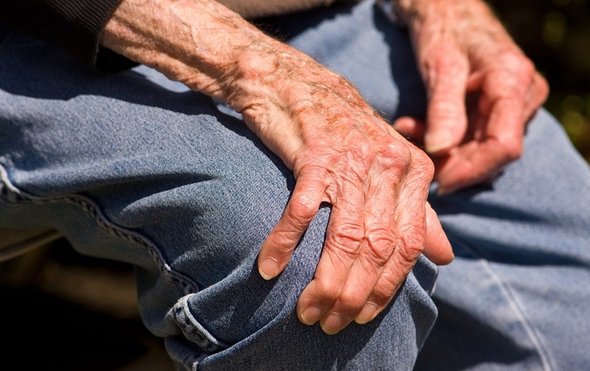(单词翻译:单击)
听力文本
This is Scientific American — 60-Second Science. I'm Karen Hopkin.
Are you one of those people who can tell when a storm is approaching based on your achy knees? Well, you may think you are. But a new study of more than 1.5 million seniors finds no relationship between rainfall and doctor visits for pain. The results are in the British Medical Journal.
The idea that our bodies are barometers for all sorts of weather-related phenomena—including changes in temperature, pressure and precipitation—is not a new one.
"Hippocrates himself actually postulated this idea in nearly 400 B.C." Anupam Jena, a physician and expert in health care policy at Harvard Medical School and the Massachusetts General Hospital, who led the study.
"If you talk to people I'd say millions and millions of people probably believe that things like rainfall influence symptoms of joint pain and stiffness. But if you look at the studies there's actually been surprisingly little evidence to suggest that is true. Most of the studies have been quite small. And we were interested in thinking about whether we could approach this question in a 'big data' sort of way."
He and his colleagues looked at information collected in more than 11 million visits that older Americans made to their primary care physicians. They compared these records with data on daily rainfall. And they asked: do more people report sore backs or swollen joints when the weather is inclement?

"And what we found is if you look at days where it rained versus days where it didn't rain, there is no difference in the proportion of visits to a doctor that involved a complaint of joint pain or back pain."
They saw no "rain effect" even when it poured for seven days straight. And if you're thinking, well, what if people couldn't get an appointment until the skies cleared up...
"And if you look the week after a period of heavy rainfall, you still see no relationship. And that doesn't mean that factors like rainfall or temperature or humidity don't affect joint pain and symptoms of joint achiness and stiffness. But in this sort of big data approach, we didn't find any evidence for it."
Of course, it could still be that the pain from rain is not enough to complain. "It could be that patients take over-the-counter pain medications once these symptoms hit, and so when they see their doctor they're not actually in enough pain to mention it." And the casualties of low-pressure fronts simply move on—gingerly.
Thanks for listening for Scientific American — 60-Second Science. I'm Karen Hopkin.
参考译文
这里是科学美国人——60秒科学。我是凯伦·霍普金。
你是那种可以根据膝盖疼痛来判断暴风雨即将来临的人吗?嗯,你可能认为自己是。但是一项针对150多万名老年人的新研究发现,下雨和疼痛就医之间没有联系。这项研究结果发表在《英国医学期刊》上。
我们的身体是温度、压力和降水变化等各种天气现象的晴雨表,这种想法并不新鲜。
“希波克拉底本人实际上在公元前400年就提出了这个想法。”安努帕姆·耶拿是哈佛医学院和麻省总医院的内科医生兼医疗保健政策专家,也是这项研究的负责人。
“如果你和人们谈论这点,我敢说,可能有数百万人认为,降雨会影响关节疼痛和僵硬。但是如果你看看这些研究,出乎意料的是,实际上几乎没有证据可以证明那是真的。以前大多数研究规模都相当小。我们想知道是否可以用“大数据”的方式来解决这个问题。”
他和同事查看了从1100多万次就诊纪录中收集到的信息,这些信息是美国老年人在他们的初级保健医生那里留下的记录。研究人员将这些记录与每日降雨量数据进行了比较。然后他们提出疑问:天气恶劣时,会有更多人说自己背部酸痛或关节肿痛吗?
“我们发现,将下雨天和不下雨天相比较时,你会发现因为关节疼或背部疼痛而就医的比例没有差异。”
即使连续下7天大雨,他们也没有看到任何“降雨效应”。要是你在想,也许在放晴之前人们无法预约就诊……
“如果观察暴雨过后的那周,你依然看不到任何联系。这并不意味着降雨量、温度或湿度等因素不会影响关节疼痛和僵硬。但是利用这种大数据的方法,我们依然没有找到任何证据。”
当然,也可能是降雨引发的疼痛并不足以抱怨。“可能这些症状一出现,患者就会服用非处方止痛药,而当他们看医生时,他们实际上并没有很疼,所以不会向医生提及。”低压锋过境造成的伤亡人数持续增加,请小心。
谢谢大家收听科学美国人——60秒科学。我是凯伦·霍普金。
译文为可可英语翻译,未经授权请勿转载!
重点讲解
重点讲解:
1. all sorts of 各种各样的;形形色色的;
例句:We overlook all sorts of warning signals about our own health.
我们忽视有关自身健康的种种预警信号。
2. be interested in 感兴趣的;有兴趣的;关心的;
例句:She was interested in the furnishings of that room.
她对那个房间的摆设儿很感兴趣。
3. compare with 比较;对比;
例句:Liz was then able to compare the eagle's eyesight with that of humans.
随后,莉斯将老鹰和人类的视力加以对比。
4. clear up (天气)放晴,变晴朗;
例句:It all depends on the weather clearing up.
这完全取决于天气是否会放晴。


